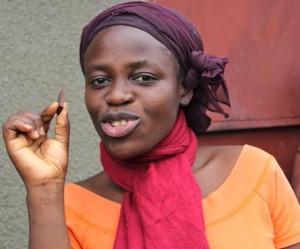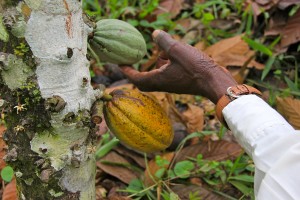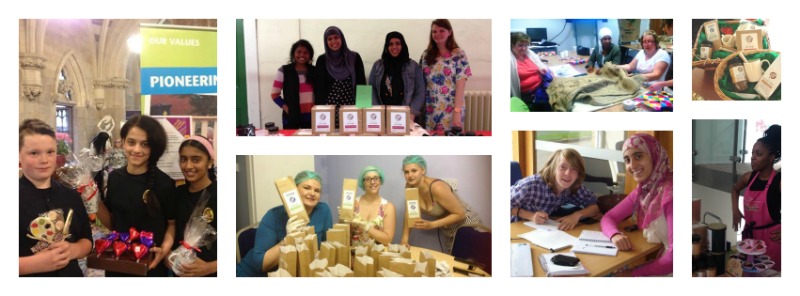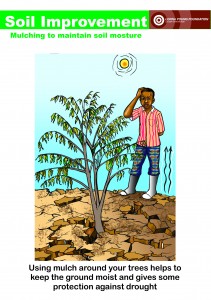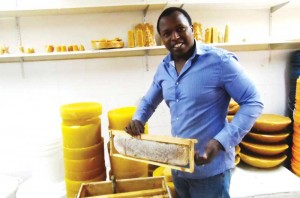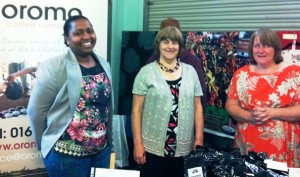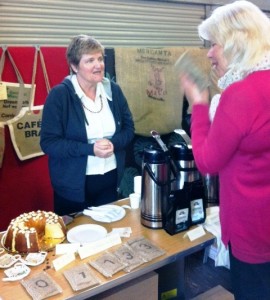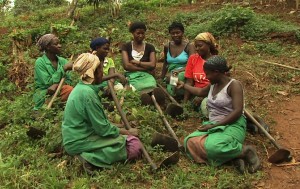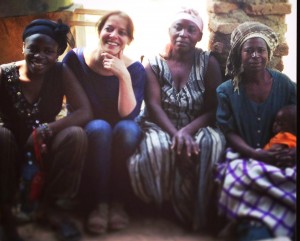Categories
Recent Posts
New Tea Blend, Reviving Cross-Cultural Dialogue
21/03/2014 – 10:37 pm
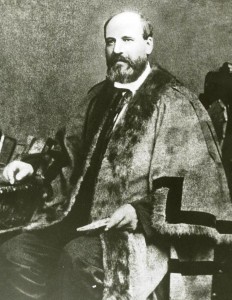 * Historic article – tea not currently created and supplied by the LYF – but if you are an interested tea company, feel free to get in touch with us! For the latest news on this project in 2019, see https://robertreschidstanley.wordpress.com/
* Historic article – tea not currently created and supplied by the LYF – but if you are an interested tea company, feel free to get in touch with us! For the latest news on this project in 2019, see https://robertreschidstanley.wordpress.com/
One hundred and fifteen years after his death, the great-great-great granddaughter of Manchester tea merchant and Muslim convert, Robert ‘Reschid’ Stanley, is using tea to promote conversations to bring different cultures together. Inspired by the work of her ancestor, the LYF’s own Christina Longden and the LYF team, aim to launch a new tea blend, promoting cross-cultural dialogue in UK communities.
Extract from article in The Muslim March 2014
Born in 1828, Robert Stanley, a renowned tea merchant, grocer and Mayor of Stalybridge converted to Islam aged 69. As one of four converts in a Manchester-based community of 40 Muslims, Robert became a well-known and vocal advocate promoting a greater understanding of Islam across the UK and Vice-President of the Liverpool Muslim Institute (Britain’s 1st mosque).
Prior to his conversion, Robert had avidly followed the problems taking place further east, particularly in Turkey with the Russo-Turkish war. Letters that he wrote on the subject were even raised at parliamentary level in Westminster. Later, Robert wrote to the Ottoman Caliphate recommending that they could rebuild manufacturing and trade in the country if they were to send young men to England to study cotton and wool manufacturing techniques in Lancashire and Yorkshire.
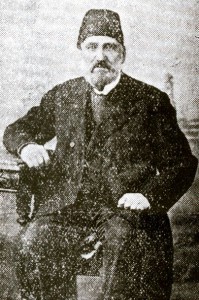 Robert also suggested to the Caliph that it would be wise to have an authentic and fresh translation of the Qur’an so that English people could better understand the teachings of Islam – the only translations available at that time being made by Christians.
Robert also suggested to the Caliph that it would be wise to have an authentic and fresh translation of the Qur’an so that English people could better understand the teachings of Islam – the only translations available at that time being made by Christians.
Robert’s life and exploits were documented in ‘The Crescent’, a weekly record of Islam in England. The publication was the production of the Sheikh ul-Islam of Britain – the country’s most famous white convert, William ‘Abdullah’ Quilliam. in
Amazingly Christina’s brother, Steven, Robert’ great x 3 grandson also converted to Islam – ten years before he was even aware of this amazing story and his familial connection to it!
Now, 115 years on, Robert Reschid’s great x 3 granddaughter, Christina, Director of the Lorna Young Foundation and Not Just a Trading Company is pleased to see a tea blend that remembers her remarkable ancestor.
Through Not Just a Trading Company (NJaTC), Christina, the team, and the youth enterprise groups, are importing direct from the growers a range of Fair Trade tea, coffee, chocolate and other ethical products that the youth enterprise groups market to learn business skills and generate income.
NJaTC is about to launch a new product – the Robert Reschid tea blend, with the aim of sending this tea out to various faith and community organisations for them to invite each other for tea and conversation.
We hope to raise £3,000 to make and send out 1,000 packs of tea to communities all over the UK, to promote cross-cultural dialogue.” You can support this project by donating here.
* NOTE – this is a historic article – tea not currently created and supplied by the LYF – but if you are an interested tea company, feel free to get in touch with us! For the latest news on this project in 2019, see https://robertreschidstanley.wordpress.com/
Trustee Profile – Julie Harrington
06/03/2014 – 3:48 pm
Our most recent Trustee, Julie Harrington, joined the LYF after spending several months supporting us through the Small Charities Coalition Skills Sharing Programme. Here is an extract of an interview with Julie by the SCC.
1. Your name:
Julie Harrington
2. Name of the charity you supported:
Lorna Young Foundation (LYF)
3. The match need:
Fundraising/marketing.
4. How long did your match last?
Ongoing – taken up my first ever trustee role with the charity!
5. Please describe your match experience and how it worked?
I have spent time with two directors, Ian and Christine and the small team at LYF to talk through the marketing of the foundation and clarifying the core fundraising proposition of the charity. We have done this via meetings, emails, sharing resources.
6. What did you learn both personally and professionally from the match?
It has been an excellent opportunity to get involved with the charity at a strategic level, to act as a soundboard for the directors about future growth plans and act as a kind of filter for ideas and strategy. I had no idea of the existence of the charity here in my home town and was delighted to learn all about LYF and its growing impact in the UK and overseas. After working as a fundraiser for 24 years, I have recently accepted a role as Trustee for the LYF – my first time ever as a Trustee. I am hoping I can continue to contribute for the longer term in this capacity and help LYF to expand. They are an excellently competent team already – I just hope to offer additional time and resources that can help them move to another, more sustainable level.
7. What would you recommend about the matching service to other would-be supporters?
I have been privileged to work with some of the masters of fundraising over the years – organisations and individuals – and as you gather experience in the profession, this in itself becomes invaluable. The school of hard knocks counts for a lot! So Small Charities Coalition’s mentoring scheme is an excellent vehicle to be able to give back to the profession in a targeted way. Small charities are always resource limited and so saving them from going through a few of those hard knocks and expanding their resources with a bit of your time and your experience can be a great boost. But as a supporter, you also continue to learn. You gain mentoring skills and sometimes practice a mini kind of consultancy experience too. It’s fascinating to be involved from a purely interested party point of view too – none of the pressure of being an employee nor the responsibility as a Trustee. It has been a real happy, comfortable medium for me.
8. If you have any other comments please share them below
I first became aware of the Small Charities Coalition at a stand at the Institute of Fundraising and instantly thought it a cracking idea, a way to strengthen the fundraising profession and the sector. This was 2009 and my first charity match (Bone Cancer Research in Leeds) was active for more than 18 months. In fact we still meet up for updates – it’s become a lovely habit. I recently helped them fill a vacancy by introducing them to an eminently suitable candidate who got the job – so I suppose when it goes well, they become part of your wider network and the relationship is ongoing.
First Climate Change Coffee to Protect World’s Forests
19/02/2014 – 1:31 pm
After a decade of working with small producers on climate related projects, our very own Cristina Talens – LYF International Programmes Manager, has now launched the World’s first climate-change gourmet coffee.
Over the last 10 years, Cristina Talens has worked alongside thousands of small farmers, indigenous people and plantation workers in coffee, tea and cocoa in over 14 countries across Africa, Asia and Latin America. During that time she has seen first-hand the environmental and social impacts that climate change is having on agricultural communities which grow the UK’s favorite coffees.
Some 25-30 million hectares of the world’s forests are lost each year to illegal logging and clearing for agricultural land. Cristina says, ‘These forests act as giant carbon banks, when the trees are cut down, they release carbon into the air, thereby contributing to the global problem that is climate change. It is estimated that 20% of global greenhouse gas emissions come from the continued destruction of the world’s forests.’
Now, to help save the world’s forests, she has created Source Climate Change Coffee, the first single origin gourmet coffee which incentivises small farmers to plant trees in these ecological hotspots. Source is today the only conservation-led coffee company which makes direct payments for reforestation carbon credits to ensure that every bag or tin that is sold is carbon neutral.
To find out more, you can contact Cristina through the LYF, or directly at Source Coffee.
Not Just a Great Youth Enterprise Programme
12/12/2013 – 2:28 pm
We have been running our ethical youth enterprise programme for four years now – the last three years through our social enterprise Not Just a Trading Company.
So far, we have supported almost 200 young people, older people and unemployed people through our local enterprise groups and workshop programmes. They have gained invaluable business skills, and experience; between them, have created all of the quality fair trade products that now make up our branded range; they have earned thousands of pounds for their groups, won awards for their work and many have gone on to employment, self employment, further education, and one group even created their own community co-operative.
We are now running and supporting groups in Manchester, Oldham, Doncaster, Rotherham and London. We are working with a wide range of partners and organisations that are sponsoring and supporting local groups, including councils, youth development organisations and housing associations.
Two of our latest groups are running in Rochdale (with Rochdale Boroughwide Housing) and in Wakefield (with Youthworks); we thought we tell you about the impact the programme has had, through the words of two of the youth workers from our local partners RBH and YouthWorks:
“The young people involved are really enthusiastic about this project: some because they are passionate about the fair trade movement, others because they would like do their bit towards fundraising for a skate park locally.”
“The Rochdale group formed in April 2013 and they have bonded really well as a team and learnt a lot from becoming a group with different backgrounds…”
“The ideas they have come up with have been inspiring, they have been able to use the skills they have learnt to work as a team to enable other organisations to see them as a serious business for them to invest in.”
“I have asked other staff from the housing association to talk to the group in the New Year about ‘business planning’ and ‘profit margins’.”
“I have absolutely enjoyed working with this group and hope what they have achieved from the ‘Not Just A Little Business’ will help them to gain their dream job in the future. They are full of ideas and hopefully they will be able to teach other young people from their experiences of this group.”
If you want to talk to us about our youth and community enterprise programmes, workshops and courses, we would love to hear from you; get in touch.
New Smallholder Support Network Leaflet
11/12/2013 – 5:34 pm
The LYF Smallholder Support Network (SSN) is now in its fourth year.
The LYF has been developing and running its Smallholder Support Network in Africa for three years now, and it is producing some amazing results. Launched in Kenya in 2010, the SSN now includes several core elements:
Weekly radio broadcasts (reaching millions of farmers)
SMS (text message) interactive service, enabling small farmers to text questions to the radio panels
Comprehensive training manuals available to local colleges to deliver face to face in farmer communities
Website for farmer co-operatives and NGOs to use to access information and advice
The SSN is now running successfully in Kenya and the Democratic Republic of Congo (DRC); in 2014, we aim to expand it in to tea farmers in Tanzania and to coffee farmers in Ethiopia.
Why not download the new SSN leaflet here SSN new leaflet Dec 13 .
Can Social Media Help Kenyan Youth in to Farming?
17/09/2013 – 7:59 pm
Social media platform helps share and exchange farming information and provides a marketing avenue for young and upcoming farmers
(extract from an article in the Nairobi Business Monthly Sept 13)
Joseph Macharia is probably most well known for developing the hybrid of a stingless bee when he worked at the international scientific research institute ICIPE (International Centre of Insect Physiology and Ecology) in 2011. But he describes himself as a farmer, and asserts that his passion has always been farming, whether socially, education wise or with work. And indeed he is one with three dairy cows and a small coffee plantation in Nyeri.
His enthusiasm for a sector that many Kenyan youth shy away from runs so deep that Macharia decided to broaden the appeal of agriculture among the country’s youth by engaging with them through the social media platform of Facebook.
He started the Mkulima Young Facebook page six months ago, and complemented it with the Mkulima Young website where farmers exchange information and market their produce. This, he says, was driven by the fact he wanted to pull the youth into farming because it is being viewed as an after retirement activity.
“The average farmer is 65 years old. In Kenya it is normal for one to be given livestock and other farming apparatus as retirement gifts. This classification of farming as an old man’s affair has to stop and what better way to do that than reach out to the youth via social media where they are most comfortable,” Macharia says.
Macharia, who is in his mid 30s, adds that young people might engage in farming if they were given the right information and inspiration. His decision to reach them through a social media platform, he explained, was because many of the youth were in their element when online or on Facebook, and as such would feel comfortable in seeking assistance and in sharing, selling and buy produce.
The Facebook page he set up, therefore, is aimed at reaching youthful farmers and those that aspire to venture into the field.
“The reason why I’m targeting the youth is because they are innovative and willing to learn. And also because I’m hoping that we can move away from conventional farming, embrace the use of technology and try to grow other crops apart from the traditional ones,” Macharia explains.
In just six months, the digital farmers’ hub has risen to over 17,000 members and is attracting graduates and school leavers into the agribusiness sector. On this same platform, success stories are shared to motivate members.
Macharia was surprised by the high interest that the page registered, but is confident that he will be able to provide quality information on these platforms because he can track the needs of these digital farmers and respond accordingly.
He works with a team of three who together track comments and questions and generate responses. The web page complements the social media page and creates an avenue for those that want to start a business and those who want to buy or sell agricultural produce. The two avenues together have seen youth who previously could not access markets earn thousands of shillings via the online platform.
Macharia also hosts a radio program called Mkulima Young on Kikuyu station Coro FM, in an attempt to reach the youth through broadcast media. The show is sponsored by the Rockefeller Foundation
Tackling Unemployment Through Fair Trade Community Enterprise
30/08/2013 – 4:28 pm
Right now we are all a mixture of sadness AND excitement! How is this possible? Well, our very first short-term ‘Ethical Enterprise Course’ has come to an end. But the positive bit for us has been seeing the incredible changes in the lives, aspirations and the new social enterprise drives of all of those who have attended the course.
Supported by an ESF Community grant through the WEA, we delivered a 10-workshop course, using our successful ‘Not Just a Community Enterprise’ learning model. We wanted to help create some new ideas for The Oromo Coffee Co social enterprise – as well as helping local people back into work. We named our course ‘Equality and Unity’ and designed a bite-size course for people who are unemployed in the Tameside (east Manchester) area.
Over 10 sessions – and 5 ‘practice sales/work experience’ opportunities, the group learned how to set up and run a community-based social enterprise with a ‘fair trade focus’ – and one which used The Oromo Coffee Company as a great hook on which to hang this very practical series of workshops.
We deliberately created a course where the content and pace was set by the learners themselves, where it was tailored to their own interests and learning needs and where we had the minimum amount of stuffy classroom-based sitting and listening to the likes of us drone on!
As well as learning about the basic components of running a fair trade community enterprise, some of the fantastic learning events which the participants were involved with included:–
Visits to Unicorn Wholefoods in Chorlton cum Hardy and a crafts co-operative in Saddleworth
Running a Coffee/Cake and Crafts stall at the Chorlton coffee festival
Running a stall at Saddleworth ‘Yanks’ weekend
Running a stall at New Charter Housing Association community fair
For the LYF, one of the key aims of this course was to bring different communities in Tameside together in the name of ethical enterprise and supporting each other in employment opportunities. Being unemployed can crush the soul – and our work at the LYF has always proven to us that people who are marginalised in this way are eager to be able to support those who are also struggling in poverty – those in developing countries and whose lives are blighted by exploitation within the trading system.
We certainly feel that we have succeeded in our new venture and we were over the moon to receive some of the comments back from course participants – such as:
“It’s really helped me – more than anyone I have received advice from – to truly set up a business. I’ve learned how to price things properly – and fairly. Before I was too shy about it and wouldn’t ask for enough for all of the work that I put into my crafts.”
“I came to this course knowing nothing about social or ethical enterprise. But now I know how to begin one. And I understand my own drives in terms of the kind of causes I want to help in setting up a social enterprise. Of course I need to be able to support my own family too – but I’ve now got some solid plans…”
“English is my second language and I was so worried I wouldn’t understand it all. But I have loved having this learning for free. I just thought that this course would help me make my CV look nicer and maybe get another cleaning job – but I am flying now. I truly appreciate it. I cannot believe the support and help I have had from all group members in setting up my own little business and the other day when we held a stall together – I sold out of all of my products and had to ask for more to be brought in. Yes I am so very positive for my future now.”
We would like to finish by thanking the Workers Education Association (North West) who administered the ESF grant which helped us to run this course and also to give a huge clap on the back to Chandan Mistry and Nic Carter from the Health & Wellbeing team at Tameside Council who provided some fantastic support. To New Charter Housing Association too – who are seeing the huge potential in working with The Oromo Coffee Company and who are clearly proud of the commitment of their Oromo and non-Oromo residents!
So, if anyone else would like one of these bite-sized courses running with a community group – get in touch.
LYF at Oromo Community Gathering
20/08/2013 – 8:25 pm
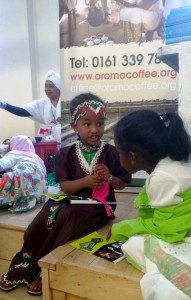 Many followers of the LYF will know that back in 2008, we helped set up the Oromo Coffee Company with a group of Oromo refugees from Ethiopia who had been resettled in the UK.
Many followers of the LYF will know that back in 2008, we helped set up the Oromo Coffee Company with a group of Oromo refugees from Ethiopia who had been resettled in the UK.
Since then, the OCC has continued to grow and establish itself as one of the UK’s most innovative and progressive coffee companies – a non-profit social enterprise, owned and run by members of the Oromo refugee community. As well as selling high qaulity, Fairtrade and organic coffees from Ethiopia, the OCC is actively engaging in community development work in the UK, helping Oromos and local communities to learn about setting up and running a community enterprise, seeing the value of social enteprise and working for the benefit of the wider community both in the UK and back in Ethiopia.
This week we joined the OCC at a gathering of the England Oromo Community, set up to help Oromo people resettled in the UK to celebrate and promote their culture and identity. Some inspiring community leaders spoke about how important it was for the Oromo community in the UK to intergrate, to establish itself within the wider community, but to also ensure that, young Oromo people in particular, are able to learn their mother tongue language, understand their cultural heritage and what led them to flee their homeland.
It is great to see the Oromo Coffee Company becoming well-established both in the market-place and amongst the Oromo community across the UK. Onwards and upwards…..
Women cocoa farmers claim rights, despite escalating violence in Democratic Republic of Congo (DRC)
16/08/2013 – 8:28 pm
The LYF is now 10 months into our Farmer Radio project in DRC. We are working to engage 10,000 women cocoa farmers across the North Kivu area, delivering agricultural extension advice and answering their questions on farming and processing activities related to cocoa production.
Our local partners IDAD,[1] have established ‘Listening Groups’ at the Union of Progressive Women Farmers (UFAP)[2] and at the organisation Action for Development and Environmental Protection (ADEP)[3] who work to ensure protection of the forest and promote agro-forestry. So far, some 1,500 new cocoa seedlings have been distributed to farmer members across the forest regions of Beni, Kyanzaba, Mutamba. Training has also been delivered by IDAD extension field officers to members from both organisations.
Every week, our female radio presenter takes interviews and speaks with the farmers and our Congolese expert on food and maternal health – co-hosts the programme, speaking to women in the field about food security and inter-cropping. (See excerpts from radio)
‘Over the air’ the women farmers use radio to encourage others to lift themselves out of poverty and to overcome the challenges they face. Getting their voices heard is a serious issue for these women. Serious – but not easy. For some, just writing a simple text message to the radio station so that they can ask about agricultural issues will involve walking for miles to find a friend or family member who can read and write.
Our radio programmes however, offer women something more than just agricultural extension – more than information on markets and prices. The women are asking us about equality and the right to earn a living, so that they can feed, clothe and educate their children. And crucially, in North Kivu, the programme is offering women the opportunity to find their voice at a time when the situation remains violent and unstable. A representative of a local partner group who travelled into Beni on 5th June 2013 reported;
“The security in the Kivu area around Beni has deteriorated. In the last week, two people were killed in Kasindi, one taxi driver the day before our arrival and another person two days before that. The maji-maje carried out another attack on the army camp in Beni town where some of their comrades were held. The attack was carried out in broad daylight and shooting went on for almost two hours. Most of the rebels were killed and the people in town were terrified. Abductions of females started a year ago and were first aimed at obtaining ransom. However, the abduction of women and young girls in the area Mavivi-Oicha, Mayimoya and Eringeti started about a month ago. Since then, more than a hundred have been taken away into the bushland. The kidnapping takes place at gunpoint and in broad daylight. One woman who was pleading to be allowed to take her young child with her was shot in the head and her body was dumped on the side of the road. The population protested against this and as a result, the left side of the Beni –Eringeti road was transformed into a military camp.” Regardless of this action, the right side of the road is very much perceived to be ‘zone rouge’. Where anything goes – even murder – when it comes to the casual appropriation of women.
“Male farmers living in this region risk their own lives or their wives, sisters or daughters being abducted and murdered if they attend to their fields. Women farmers in the area face extreme danger on a day to day basis. The road connecting to Nobili is even worse, with the whole area being largely under rebel control. It is not clear who is behind or who is leading these men. The local population are hoping that a neutral force will provide them with protection but fear that the current attacks are being steered by those who aim to be taken into account and to gain power, when the peace force arrives.”
Our LYF Programme Manager, Cristina Talens, travelled to the Congolese / Uganda border town of Kasese to meet our partners from Radio Graben and to translate the first transcripts of the radio programmes, telling us;
“The situation remains volatile in Eastern Congo. An offensive UN brigade was deployed in mid-May, so we have been unable to travel across the border to meet the farmers ourselves. However, we have been able to bring on board a new cocoa trader who is exporting out of Beni and who will be taking part in our multi-stakeholder group to support that will help women cocoa farmers to produce the very best quality crop.It has been heartbreaking to speak with the women here and to listen to what they are saying about their lives under these conditions of conflict.
On the 8th March 2013, to mark international women’s day, the women members from UFAP marched to the Ministry of Family and Health to demand that women be protected against the escalating violence and even there, one of their members was beaten during the demonstrations and ended up in hospital. We covered this issue in our radio programme and we sent messages of support to all the women in the region who were suffering violence in their communities.
Due to the ongoing situation, the LYF and our local partners needed to adopt an alternative approach to ensure that the women involved in our Farmer Radio DRC pilot could receive training. Instead, we were able to bring a group of women farmers from North Kivu across the border and into Uganda where we worked with IDAD, using the college facilities of URDT.
[1] Initiative pour le Developpement de l’Agoforesterie Durable (IDAD)
[2]Union de Femmes Agricultrices et Progressistes – UFAP

